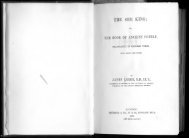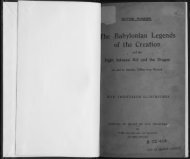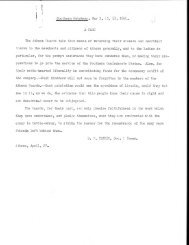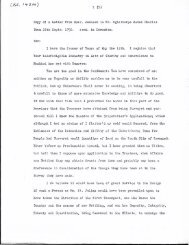Create successful ePaper yourself
Turn your PDF publications into a flip-book with our unique Google optimized e-Paper software.
634 HARPER'S WEEKLY. [OCTOBER 4, <strong>1862</strong>. OCTOBER 4,<strong>1862</strong>.] HARPER'S WEEKLY. 635<br />
THE CRIPPLE AT THE GATE.<br />
LOOK I bow the ho<strong>of</strong>s and wheels to-day<br />
flutter tbc diut on the broad highway,<br />
When Beauty, and Fuhloo, and Wealth, and Pride<br />
On aaddle and cuihlon serenely ride!<br />
The very steeds hare a conscious prone*<br />
Of pride In their elegant freight 1<br />
Lore and laughter like Jeweli allp<br />
From the sparkling eye and the merry lip:<br />
You nerer would think that the Nation'* lift<br />
Hung on the thread <strong>of</strong> a desperate strife,<br />
Unless from thoe you ibould turn, by chance,<br />
To the Cripple at the Gate.<br />
Weary, and footsore, and ragged, and soiled.<br />
Through the wuniner glare he bus slowly tolled<br />
Along th« edge <strong>of</strong> the broad highway.<br />
Since the early dawn <strong>of</strong> the westering day:<br />
His ragi are flecked with the duity fcam<br />
That flew from the gilded bits<br />
Of the champing steeds that pawed him by;<br />
And a haggard shadow IB In his eye,<br />
Bnt It Is not the gloom <strong>of</strong> nn envious pain I<br />
He hai left a limb on tlie battle-pUra,<br />
And to win his way to hi* distant home<br />
At my gate, a Beggar, be sits!<br />
He tens me hli tula in a ilmple w»jri<br />
•I had nothing," be >ay», "ncept my pay,<br />
And a wife and four little girls, and «o<br />
I wot all my money to (him, you know]<br />
M hen I lost my limb. Sir—tot that I'm lame,<br />
I do not complain, for, you see,<br />
TU the fortune <strong>of</strong> war, and it might be wane;<br />
And I'd tew the other to stop the curio<br />
Of i his terrible strife! But I meant to aay,<br />
When I let the hospital I'otlur day,<br />
I did think I had a kind <strong>of</strong> a claim<br />
To be aent to my village free.<br />
"Don't you think It bird youirelf, Slrf True,<br />
There's a hundred dollars <strong>of</strong> bounty duo<br />
In three yenre, or when the wurV inded; but how<br />
Long may that be—ran yon tell me nowf<br />
I did not enlist fur bounty, I trust—<br />
My eoBMlenoe I n rer hare sold;<br />
But how don It look for a soldier to ' tramp,'<br />
Bagging 111' way like a wgnbond scamp,<br />
Fr..m the fields when be <strong>of</strong>ten risked hlr> life,<br />
To the ln>me where he left hU uabca and wife.<br />
In a uniform mide <strong>of</strong> tatters ami dust *<br />
Instead <strong>of</strong> the 'blue and goldr<br />
•Whose tanlt this It, Mr, I do not know,"<br />
BnM the wnyworn mm an he row to pi;<br />
"But <strong>of</strong> ihK alan. I am sure—the right<br />
Of H soldier returning In such a p l^ht<br />
To the bom,' wtvncu, a few «hort m- nthj ago,<br />
He murclied In a gallant band.<br />
Win music, and banner*, and shining steol<br />
Will didl mor- ran to tiie battl -ptul.<br />
And caiin more Ixwomi* with Couu* m a«cu,<br />
Than the went traitor deuOllwt >puL<br />
Dm't you seo yuursarting words. Her soldier was gone—her stake<br />
n the war. Her hope <strong>of</strong> success seemed to have<br />
died with him. She did not feel like weeping.<br />
She scarcely knew that she felt at all; only the<br />
cold, dull ache that made her clasp her hand tight<br />
o her heart reminded her. She said to herself,<br />
still calmly,<br />
" I must go to Emily and tell her that I sent her<br />
brother to his death."<br />
She put on her things, and wondered vaguely<br />
hat she did not weep as she saw her own still,<br />
composed face in the glass.<br />
Emily came to her, in the same room, the front<br />
larlor at'School, where they had met first—came<br />
n joyful with welcome, but started back appalled<br />
by the white, still face she met. Miss Barclay<br />
went up to her and said, drearily,.<br />
1 ' Emily, I am all you have now. He is gone!"<br />
The girl to whom the ill news came with such<br />
ell suddenness burst into a passion <strong>of</strong> grief; and<br />
hen, trying to comfort her, her friend wept also,<br />
ind the tears were a strange solace. She took<br />
!mily home with her—her sister from henceforth.<br />
She might go back to schoo1 mother year, perhaps<br />
—at present they had need <strong>of</strong> each other.<br />
How dreary the months were which followed!<br />
imily was the first to learn resignation for the<br />
oss <strong>of</strong> her dead, who died so gloriously. Kate was<br />
taunted forever, as he had feared she would be, by<br />
he idea that she had sent him to his death; and<br />
ot even the memory <strong>of</strong> his own assurances, those<br />
generous last words uf his, could give her comfort.<br />
The summer came—the summer <strong>of</strong>'62—bringing<br />
irJ-song and blossom. The lonely salt-scented<br />
ea-breeze rippled the waves, and shook the pine-<br />
rees into melody. From afar Miss Barclay seemed<br />
to catch scent and sound. It roused her to wish to<br />
read the sea-side rocks, and press her careless foot-<br />
teps in the white sands <strong>of</strong> the beach. They went<br />
o a pleasant, quiet nook, which, as yet, not enough<br />
people had found to spoil. And there the roses<br />
an to come slowly back to Miss Barclay's<br />
hcek, and the light to her eyes. She might grow<br />
heerful again in time, she thought, if only her<br />
ancy would cease to picture one awful scene—a<br />
.tattle-field, where the eetting sun searched with<br />
ed beams for the slain, and found one fade, a face<br />
he knew, with clear honest eyes, and mouth that<br />
would never smile more. Did they wound bim—<br />
•nutilate him after he was dead? She had heard<br />
uch things—she wished she could forget them.<br />
Walking alone one* day, she heard on*he path<br />
behind her voices — Emily's and another. She<br />
nrned suddenly. Were her senses dazed? Did<br />
she dream ? Do the dead walk ? She saw a face<br />
over which Southern turf must have grown long<br />
ago, unless it bleached wbite, unburied, on the<br />
ghastly battle-field. Sight and sense failed her.<br />
For the first time in her life she fainted. When<br />
she recovered she saw only Emily. The child<br />
spoke eagerly:<br />
" It was my brother, alive, himself. He was<br />
wounded, not dead. They took him prisoner, and<br />
last week he was exchanged. When he came to<br />
New York he found we were her*, and followed us."<br />
She had poured the words into Kate's ear with<br />
might and main, bent on making her understand<br />
the truth lest she might faint again. But such<br />
swoons do not happen twice in one day. Miss<br />
Barclay comprehended all now, and was herself<br />
again ; ready, with courteous greeting, for him who<br />
came down the path—the returned warrior, with<br />
the scar seaming his broad brow, and showing how<br />
near he had come to the fate the had feared.<br />
He had a furlough to get well in, he said, and<br />
then he was going back.<br />
Of course he staid with them there at Sea View<br />
for a while, and <strong>of</strong> course they nursed and petted<br />
him as women always do their returned braves.<br />
It was strange how soon all the sadness went out<br />
<strong>of</strong> Kate's heart, the melancholy out <strong>of</strong> her manner.<br />
One day he said to her:<br />
" You are too kind to me."<br />
" I do not feel as if I could be," she answered,<br />
" when I remember what you have suffered and<br />
who sent you forth to the fight."<br />
He did not speak again for a moment, and then<br />
he asked a strange question:<br />
" Miss Burclay, what should you think <strong>of</strong> a man,<br />
an honest man, who loved a woman dearly, and<br />
felt in his very soul that he was her peer, but did<br />
not ask her to marry him because she was rii-h<br />
and he was poor, and he knew the world would<br />
brand him a fortune-hunter?''<br />
Miss Barclay blushed, but she answered brave<br />
ly:<br />
" I should think poorly <strong>of</strong> a man's courage<br />
whom the world's opinion could sway in the most<br />
sacred matters <strong>of</strong> his heart and his life; and if he<br />
believed the lady would ever remember on which<br />
side the fortune was, I should wonder at him for<br />
thinking her worthy <strong>of</strong> his love."<br />
His eyes—those honest, earnest eyes—looked at<br />
her with something in their glance which thrilled<br />
her heart with a strange, new, timid joy. He only<br />
said:<br />
" Kate, you know I love you. When I fight<br />
again who will pray for me at home? whose sol<br />
dier shall I be ?"<br />
I think her look told him before her words did,<br />
but he bent tenderly to hear the answer:<br />
"Mine!"<br />
TWO REGICIDES.<br />
SOME months ago an aspirant to martyrdom<br />
"pro aris etfocis" was extinguished by a Prussian<br />
tribunal in a simple but most effectual manner.<br />
An ignominious sentence divested his antecedents<br />
<strong>of</strong> every spark <strong>of</strong> romance, blighted his hopes <strong>of</strong><br />
immortality, stripped him <strong>of</strong> all claim to sympathy,<br />
and degraded him to the status <strong>of</strong> a common male<br />
factor.<br />
A century has elapsed since Damiens sought •<br />
niche^jn the Temple <strong>of</strong> Fame hy similar means. It<br />
is curious to note the different treatment <strong>of</strong> the two<br />
criminals, and the different sentiments their mem*<br />
ory consequently evokes. They were both guilty<br />
)f the same crime—both had raised a sacrilegious<br />
land against one <strong>of</strong> those who, " by the grace <strong>of</strong><br />
God," rule over this earth; but the historian will<br />
contemptuously record the name <strong>of</strong> Oscar Becker<br />
ts that <strong>of</strong> a cowardly assassin, while he will over-<br />
ook the heinous nature <strong>of</strong> Damiens' <strong>of</strong>lense in de<br />
testation <strong>of</strong> his cruel judges.<br />
"Whenever," says an eminent historian, "the<br />
<strong>of</strong>lfense inspires less horror than the punishment<br />
the rigor <strong>of</strong> penal law should give way to the com<br />
mon feelings <strong>of</strong> mankind." The Supreme Court<br />
<strong>of</strong> Berlin has practically acknowledged the trnth <strong>of</strong><br />
his aphorism; but it would seem that the French<br />
egal luminaries <strong>of</strong> the eighteenth century held a<br />
lifferent opinion. The sentence they passed upon<br />
Damiens, for conspiring to assassinate Louis the<br />
Tifteenth, wag death by torture.<br />
In order to carry it out the more effectually,<br />
earned physicians held long and frequent consulta<br />
tions as to the amount <strong>of</strong> agony, and the kind <strong>of</strong><br />
agony the human frame could longest support be<br />
fore death released it from suffering. Grave dis<br />
sertations were published on the subject. Public<br />
ixecutioners compared notes with the learned, the<br />
brmer contributing their experience—the latter,<br />
scientific theories. It wag at length determined to<br />
begin with the torture <strong>of</strong> the boot.<br />
The decision <strong>of</strong> this sanguinary Areopagus was<br />
promptly acted upon. At twelve o'clock on the<br />
ensuing night the criminal was conducted to the<br />
orture-chamber <strong>of</strong> the Bastile, and the first act <strong>of</strong><br />
-he bloody drama began. Those gloomy walls that<br />
lad looked down upon so many dark deeds never<br />
witnessed a sadder'scene <strong>of</strong> human suffering. The<br />
dim light <strong>of</strong> an iron lamp, suspended from the<br />
vaulted ro<strong>of</strong>, fell upon the stalwart forms <strong>of</strong> the<br />
xecutioners, and a dark group <strong>of</strong> bronze-visaged<br />
men who silently watched their proceedings.<br />
"Wedge after wedge was driven in with a sickening<br />
rash <strong>of</strong> human flesh and bone. The perspiration<br />
xmred from the brows <strong>of</strong> the executioners as the<br />
ull blow <strong>of</strong> their sledge-hammers echoed through<br />
he dungeon, but not a sigh escaped the lips <strong>of</strong> the<br />
tortured wretch. At length the physician, who<br />
tood by with a hand on his fainting pulse, signed<br />
o them to pause. Nature eould 1>ear no more.<br />
The pale morning light, struggling through the<br />
rated windows, fell on a mangled but still breath-<br />
ng mass <strong>of</strong> humanity.<br />
Weeks rolled on, and under the sedulous care <strong>of</strong><br />
ihysicians and nurses Damiens gradually regained<br />
ii.i strength. The time approached for the com-<br />
letion <strong>of</strong> the sentence.<br />
It was • cold, bletk morning in February. Snow<br />
had fallen during the night and still covered the<br />
Place de Grove; bnt, nevertheless, every available<br />
spot was occupied. The Faubourg St. Antoine had<br />
disgorged its sans-culottic population. A sea <strong>of</strong><br />
human heads surged to and fro in unwieldy mass,<br />
clinging to chimneys, clustered on the treei, bane-<br />
ing on the ro<strong>of</strong>s, they formed a brutal assemblage<br />
—fit spectator* <strong>of</strong> a brutal drama. But in the<br />
balconies and windows overlooking the "Place"<br />
were hundreds <strong>of</strong> high-born ladies, many <strong>of</strong> them<br />
youthful and beautiful. They smiled and coquet<br />
ted with their cavaliers, diamonds sparkled, and<br />
plumes waved in the winter wind. They were<br />
come to enjoy a new sensation, and to evince their<br />
loyal devotion to an outraged king. Some <strong>of</strong> the<br />
prices paid for places were fabulous. For days pre-<br />
_ vious to the execution nothing else was talked <strong>of</strong><br />
* in the good city <strong>of</strong> Paris.<br />
A scaffold, erected at the northeastern extremity<br />
<strong>of</strong> the " Place," rose in stern black lines above the<br />
shifty multitude. In the centre was a chair firmly<br />
fixed to the boards, and at one end a large stove.<br />
Iron vessels containing resin, pitch, oil, wax, sul<br />
phur, and lead bubliled and boiled on the furnace,<br />
while the flames cast a lurid glow on tbe cruel,<br />
swarthy countenances <strong>of</strong> the executioners as they<br />
completed the preparations, or watched over the<br />
seething caldrons.<br />
The hoarse murmur <strong>of</strong> the crowd was now sud<br />
denly hushed. A general movement and flutter<br />
pervaded the fair occupants <strong>of</strong> the windows and<br />
balconies. Damiens appeared, slowly mounting<br />
the steps <strong>of</strong> the fcaffold.<br />
The execuiioni-rs spent some minutes in firmly<br />
binding him to the i-bair, from the back <strong>of</strong> which<br />
extended a horizontal piece <strong>of</strong> wood about two feet<br />
in length. To this his right arm was seoarely<br />
strapped, his hand protruding just beyond it. Exe<br />
cutioner No. 1 now advanced and held under it a<br />
brazier tilled with sulphur. A horrible cry burst<br />
from the wretched man. a cry tbat seemed to issue<br />
from his very vitals, and that for months after" i rj<br />
rang in the ears <strong>of</strong> the spectators. The ladies • I i.'.<br />
dered: some nearly fainted, and retired a little «..y<br />
from the windows. Soon they returned, refreshing<br />
themselves with their smelling-bottles, and leveled<br />
their glasses once more at the scaffold. There was<br />
no fire visible. The sun had just burst through<br />
the clouds, and effaced the pale flame, in which his<br />
hand was slowly and invisibly burning. But a<br />
nameless stench filled the air, and a thick fetid<br />
smoke rose over the scaffold, gradually spreading<br />
itself out, and hanging like a pall over criminal<br />
and spectators, as if it wonld shut out the pitying<br />
heavens from this scene <strong>of</strong> cruelty.<br />
Damiens cried out no more. He sat quietly<br />
looking at the blackened bones fast withering in<br />
the flame.<br />
Meanwhile the horrible caldrons were bubbling<br />
and hissing, and the pincers <strong>of</strong> the Piovost's Court<br />
<strong>of</strong> Paris were heating in tbe furnace. The worst<br />
wag yet to come. A gigantic executioner now ad<br />
vanced and tore the criminal's flesh with the red-<br />
hot irons in six different places. His assistants<br />
followed carrying spoonfuls <strong>of</strong> resin, oil, lead, pitch,<br />
sulphnr, and wax, which they poured into the gap<br />
ing incisions. Soon the breast, the arms, the thighs<br />
were one awful wound. AH this time Faubonrg<br />
St. Antoine and Faubourg St. Germain looked on<br />
alike unsated; and the high-born dames <strong>of</strong> Lonia<br />
the Fifteenth's court smiled and chatted with their<br />
cavaliers, and looked and shrank back, and looked<br />
again.<br />
All wu not yet over. Damiens still breathed,<br />
still suffered, and occasionally cried out. Four<br />
horses were now led forward. The neble animals<br />
were almost ungovernable. All the morning they<br />
had struggled to escape from this dreadful spot;<br />
from the cries and groans, the thick smoke and<br />
alckening smell that filled the air. It was their<br />
turn now to take the place <strong>of</strong> the executioner, who<br />
could not find a fresh spot on the victim's body to<br />
torment.<br />
Damiens wag carried down the steps <strong>of</strong> the scaf<br />
fold; the horses were hacked toward him as he lay<br />
on the ground, and the nimble executioners made<br />
fast the traces. The grooms loosed their heads,<br />
and with a terrified snort they sprang forward.<br />
But human thews and sinews were too strong for<br />
them. They were thrown on their haunches, and<br />
with a dull, heavy thud tbe body struck the<br />
ground. Again and again they started. Urged<br />
on hy blows and shouts they pulled, and pulled in<br />
vain. A quarter <strong>of</strong> an hour passed away. Dami<br />
ens still lived—still breathed. At intervals he<br />
even raised big head and looked at the animals.<br />
"Oh! those poor horses!" exclaimed Mademoi<br />
selle de Priandeau, the young and beautiful niece<br />
<strong>of</strong> the Financier Bouret.<br />
Evening was approaching. The commissioners<br />
appointed to preside over the execution were em<br />
barrassed. 11 was necessary to carry it out accord<br />
ing to the strict letter <strong>of</strong> the sentence, which di<br />
rected the criminal to be quartered. The crowd,<br />
too, was waxing indignant, and clamorously de<br />
manded the cmip-de-ffract. They consulted to<br />
gether, and at length ordered the muscles and ten<br />
dons <strong>of</strong> the legs and arms to be severed. Once<br />
more the horses plunged wildly forward—and thig<br />
time all was over.<br />
One <strong>of</strong> Bentham's discoveries in morals was that<br />
the pleasures <strong>of</strong> malignity were only to be branded<br />
as evil because they were leu than the pain given<br />
in indulging them. In like manner all infliction <strong>of</strong><br />
punithment which gave more pain than it pnttntrj<br />
from being girtn, was, in Benthamite philosophy,<br />
to be regarded as leaving a balance <strong>of</strong> evil. With<br />
out going so far as this, it is still indisputable that<br />
the great end <strong>of</strong> all punishment, viz. prerention, is<br />
never attained by excessive severity. On the con<br />
trary, the very notoriety which such punishment<br />
obtains, exercises an extraordinary morbid influ<br />
ence over some minds, and actually incites them to<br />
incur the same penalty. The excesses <strong>of</strong> the French<br />
Revolution were the result <strong>of</strong> such scenes as those<br />
here described. The thirst for blond that coartly<br />
lords and ladies nurtured in the populace required<br />
ere long to l>e slaked with theirs, and exacted •<br />
terrible retribution.








